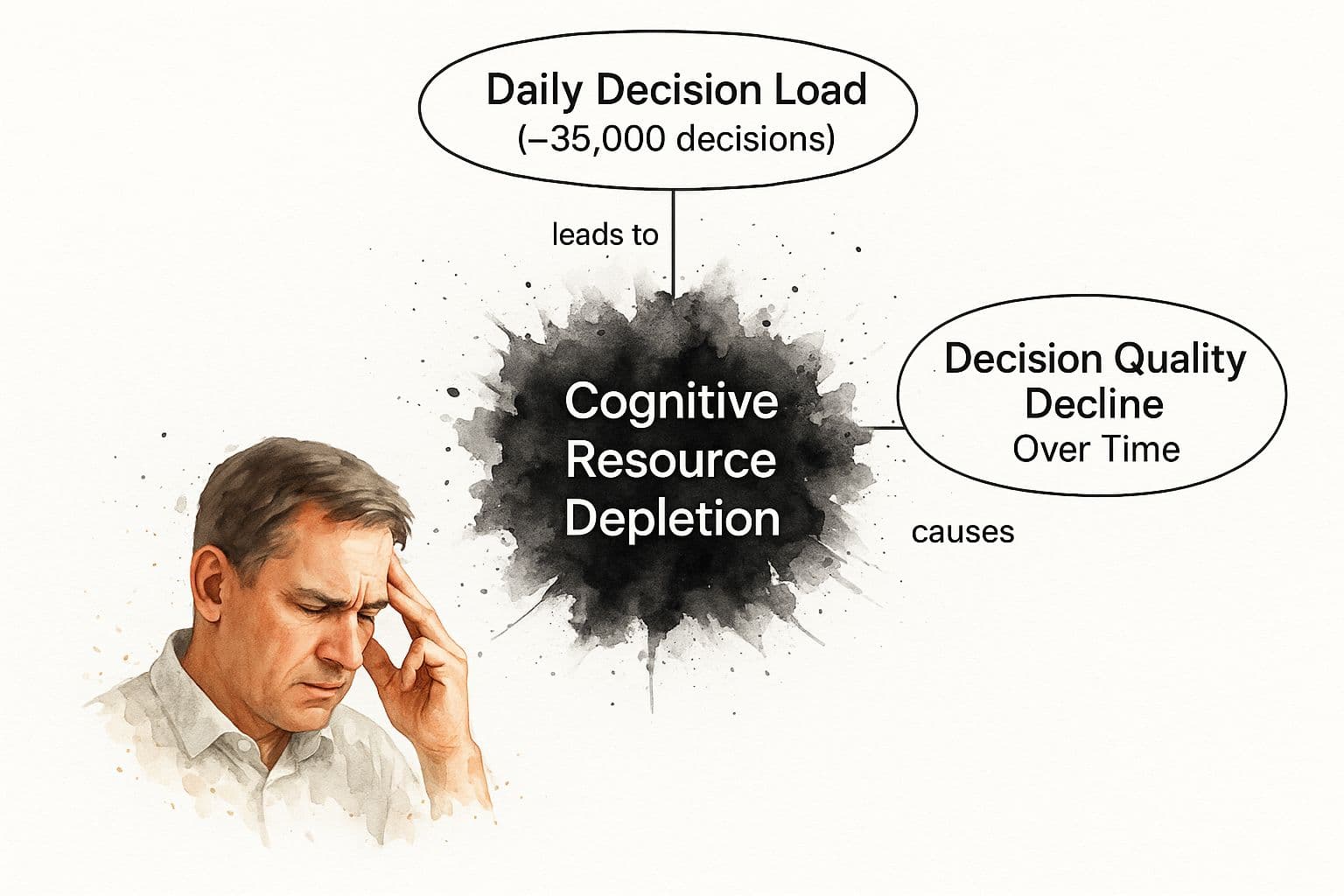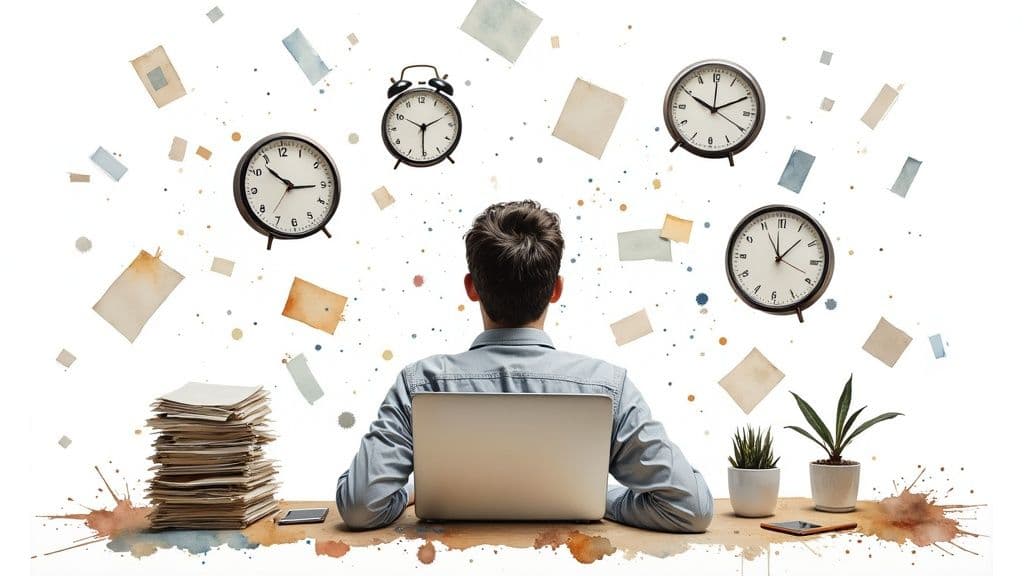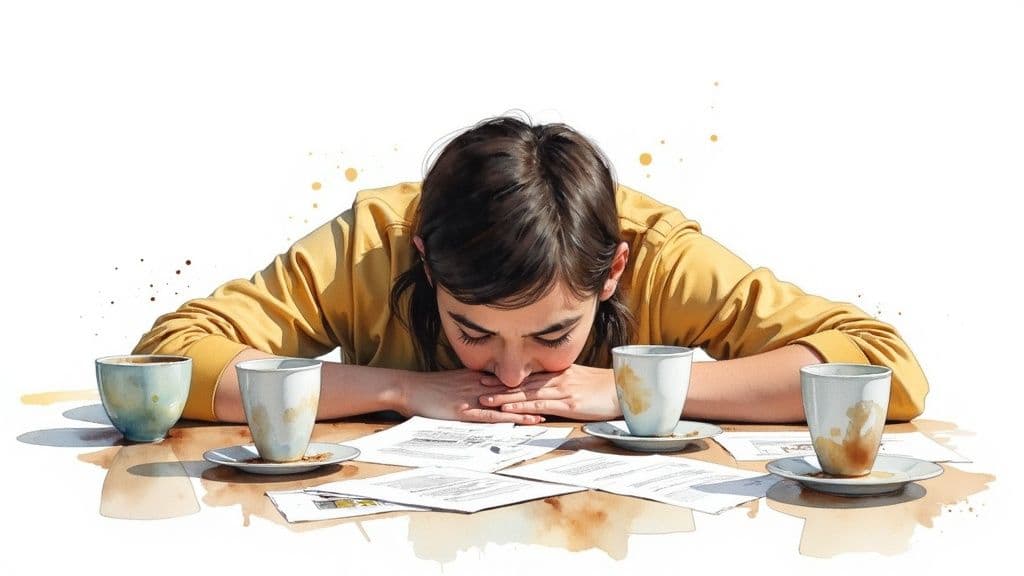Feeling drained by endless choices? Discover what is decision fatigue, why it happens, and learn practical strategies to reclaim your mental energy and focus.
September 24, 2025 (4mo ago)
What Is Decision Fatigue and How to Beat It
Feeling drained by endless choices? Discover what is decision fatigue, why it happens, and learn practical strategies to reclaim your mental energy and focus.
← Back to blog
Ever feel like your brain just hits a wall after a long day of making choices? That's decision fatigue** in a nutshell. It’s the very real decline in your ability to make good decisions after you’ve already made too many.
Think of your decision-making power like a phone battery. Every choice, big or small, drains a little bit of its charge. By the end of the day, you're running on empty.
What Is Decision Fatigue, Really?
A great way to think about willpower is to see it as a muscle. Each time you make a decision—from what to wear in the morning to how to tackle a complex project at work—you're essentially doing a rep. And just like any muscle, your brain's ability to choose gets tired after too many reps.
This mental exhaustion is the core of what decision fatigue is all about.
This isn't just a feeling; it's a well-documented phenomenon. Research has shown that prolonged mental exertion genuinely reduces the quality of our choices. In professional settings, this means the more decisions someone makes, the worse those decisions tend to get over time. The National Institutes of Health has explored these findings in depth, showing just how much it impacts performance.
The Daily Toll of Choices
It's estimated that the average adult makes around 35,000 remotely conscious decisions every single day. Most are minor, of course, but their cumulative effect is huge. This constant stream of choices slowly erodes our cognitive resources, one tiny decision at a time.
"The more choices you make throughout the day, the harder each one becomes for your brain, and eventually it looks for shortcuts."
These mental shortcuts often lead to one of two things: making impulsive, poorly thought-out decisions, or avoiding the decision altogether. This is exactly why you might find yourself buying something you don't need after a stressful day or pushing an important task to tomorrow.
This constant mental drain has a lot in common with the effects of multitasking. To learn more about how frequently changing focus also saps your energy, check out our guide on what is context switching.

The image above really drives home a simple but powerful truth: our ability to use good judgment isn't endless. It's a finite resource that we need to manage carefully.
The Brain Science Behind Mental Exhaustion

Decision fatigue isn't just in your head—it’s a very real biological process. The best way to think about it is through a concept called ego depletion. This theory suggests that your willpower and self-control are finite resources, much like a muscle.
Every choice you make, big or small, flexes that "muscle." Just like lifting weights, after enough reps, it gets tired. This mental strain is centered in your prefrontal cortex, the brain's command center for complex thought, planning, and self-regulation.
Your Brain on Empty
So, what happens when the prefrontal cortex is overworked? Your brain, being incredibly efficient, starts looking for ways to conserve what little energy it has left. It instinctively switches from careful, deliberate thinking to a more automatic, shortcut-driven mode.
This state of mental burnout has tangible effects on your choices. Studies show that a mentally exhausted brain struggles to evaluate risks and process outcomes properly. Sometimes, this makes us overly cautious, avoiding any decision that feels even slightly risky. Other times, it swings the complete opposite way, leading to impulsivity because we simply don't have the mental bandwidth to weigh the consequences. You can dig into how mental fatigue alters risk preferences in this detailed study.
Decision fatigue is your brain’s low-battery warning. It forces a shift from thoughtful, long-term planning to seeking immediate, easy answers.
This biological shift explains so much. It's why, after a grueling day, ordering takeout feels infinitely easier than cooking a healthy meal. It’s why you might scroll endlessly on your phone instead of tackling that personal project. This isn't a moral failing; it's just your brain running on fumes.
The Link to Executive Functions
The prefrontal cortex is responsible for more than just willpower. It’s the home base for our high-level cognitive skills, collectively known as executive functions. These are the abilities that allow us to plan, organize, focus our attention, and manage our emotions—all absolutely essential for making good decisions.
When decision fatigue kicks in, it doesn't just make choosing harder; it takes down your entire executive skill set with it. Suddenly, staying organized, managing your time, and controlling your impulses becomes a monumental effort. To get a better handle on how these critical skills operate, check out our guide on what is executive function.
Understanding the science is the first step. Once you see mental exhaustion for what it is, you can start managing your cognitive energy with the same care you give your physical health.
Why Modern Life Drains Your Mental Battery

If you feel like your brain is running on empty by noon, you’re not just imagining it. Our modern world seems almost perfectly engineered to exhaust our mental energy. The sheer volume and speed of decisions we navigate every day are simply unprecedented, making decision fatigue a problem for just about everyone.
This mental drain isn't caused by one single thing, but by a few key culprits of modern life that constantly chip away at our willpower. One of the biggest offenders is something known as the paradox of choice. It’s a simple but powerful idea: we think having more options is a good thing, but too many choices can actually become paralyzing.
Just think about the last time you tried to pick a movie on a streaming service. Faced with a seemingly infinite library, you might scroll for thirty minutes, weigh the pros and cons of a dozen titles, and then just give up. The mental effort becomes so overwhelming that making no choice at all feels easier.
The Hidden Cost of Constant Connection
Our digital devices are another huge part of the problem. Every ping, buzz, and notification is a tiny demand on your attention, forcing a micro-decision: Do I need to read this now? Should I reply? Can this wait? These constant interruptions pull our focus in a thousand different directions all day long.
This relentless context-switching shatters our concentration, forcing our brains to re-focus over and over again. It’s not a small thing—research shows the average employee toggles between different apps and tasks around 300 times a day. This constant mental gear-shifting makes deep, meaningful work nearly impossible and drains the very energy we need for our most important decisions. If you want to dive deeper, you can learn how task-switching drains your brainpower in this insightful article.
The modern workplace often rewards being constantly available, but this comes at a steep cognitive price. Each switch from a report to an email to a chat message is another small withdrawal from your mental battery.
When Information Overload Leads to Inaction
Finally, we’re all swimming in a massive ocean of information. Whether you're researching a new coffee maker or just trying to keep up with the news, the sheer amount of data at our fingertips is staggering. This often creates an unspoken pressure to make the absolute "best" or most optimized choice every single time.
This can easily spiral into analysis paralysis, where the fear of making the wrong choice—fueled by endless reviews, articles, and conflicting opinions—keeps you from making any choice at all. You get stuck in a loop of overthinking that burns through your mental fuel without moving you forward an inch. It's clear that to thrive, we have to start actively managing our mental energy, not just our time.
How Decision Fatigue Impacts Your Life and Career

The fallout from a drained mental battery isn't just theoretical; it shows up in real, tangible ways that can quietly derail your goals. Decision fatigue is that invisible force nudging you toward choices you later regret, especially at the end of a long day. It’s the reason that, even with the best intentions, you find yourself taking the path of least resistance.
This might look like ordering expensive takeout for the third night in a row because the idea of picking a recipe and cooking feels like climbing a mountain. It’s the late-night online shopping binge after a marathon of back-to-back meetings. It's procrastinating on that big project because just figuring out where to start requires one too many choices.
At its core, decision fatigue creates a significant gap between your intentions and your actions. You know what you should do, but your exhausted brain defaults to what is easiest in the moment.
These aren't just minor slip-ups. They add up, creating patterns that can seriously hold you back from hitting your health, financial, and personal targets.
The Professional Fallout
When we bring this into a professional setting, the stakes get much higher. What does decision fatigue look like at work? It's a silent productivity killer, chipping away at your effectiveness one small choice at a time. An executive running on fumes is far more likely to make a rushed, gut-feeling hiring decision instead of carefully weighing all the candidates.
This mental drain shows up in other critical ways, too:
- Poor Strategic Judgment: When you’re mentally fried, you can’t engage in deep, strategic thinking. You might rubber-stamp a plan without thinking through the long-term consequences or sidestep a tough but necessary call.
- Reduced Productivity: Ever stared at your to-do list for an hour, completely overwhelmed by the options? That's a classic case of "analysis paralysis," and it kills your output.
- Strained Team Dynamics: A manager struggling with decision fatigue can become irritable, inconsistent, and indecisive. This creates a ripple effect of confusion and frustration throughout the entire team.
The common thread here is a shift from proactive, thoughtful work to reactive, short-sighted responses. The quality of your work inevitably suffers when your brain is too tired to properly evaluate options and commit to a clear course of action. Spotting this impact is the first step toward getting back in the driver's seat.
Practical Strategies to Reclaim Your Mental Energy
Knowing what decision fatigue is and how it affects you is one thing, but actively fighting back is another. The good news? You don't need a massive life overhaul to reclaim your mental energy. A few smart, practical strategies can dramatically reduce your daily cognitive load, preserving your best thinking for what actually matters.
Think of these techniques as building a protective buffer for your brain's battery. You wouldn't run a marathon without training, so you shouldn't navigate the demands of modern life without a plan to manage your mental stamina.
Simplify Your Life with Routines and Automation
One of the most powerful ways to combat decision fatigue is to eliminate choices before they even pop up. This is where routines become your best friend. When you put recurring, low-stakes decisions on autopilot, you free up a surprising amount of mental space.
Consider creating a simple "uniform" for your workdays or rotating between a few pre-planned breakfast options. This isn't about being boring; it's about being strategic. Every choice you don't have to make in the morning is a bit more energy saved for the challenges that come later.
Likewise, automation is a game-changer. One of the most effective methods to reclaim your mental energy is by automating repetitive tasks that drain your cognitive resources. This could be anything from setting up automatic bill payments to using software that handles recurring administrative work.
Prioritize and Time Your Decisions
Let’s be honest: not all decisions are created equal. Giving the same amount of mental effort to choosing a lunch spot as you do to a major project proposal is a recipe for exhaustion. The trick is to distinguish between the trivial many and the critical few.
A simple but effective method is to ask yourself: "Will this decision matter in a week? A month? A year?" If the answer is no, make the choice quickly and move on. For low-impact decisions, let "good enough" be your guide.
Timing is just as crucial. Your brain's ability to make sound judgments is sharpest when you're well-rested and fed.
Schedule your most important, high-stakes decisions for the morning, right after you've had a chance to rest and refuel. Pushing critical thinking to the late afternoon, when your cognitive battery is already low, is setting yourself up for poor outcomes.
This kind of proactive scheduling ensures you’re allocating your best mental resources to your biggest priorities.
Systemize Your Choices and Limit Your Options
When you do have to make a choice, having a system can save you from the endless spiral of analysis paralysis. For bigger decisions, create a simple framework. This might be a list of three core values your choice must align with or even a basic pro-and-con list.
For daily choices, intentionally limit your options. Instead of asking "What should we have for dinner?" and staring into a void of infinite possibilities, try asking "Should we have pasta, tacos, or that leftover soup?" Reducing the choice from infinite to three makes it instantly more manageable.
You can apply this approach almost anywhere:
- Meal Planning: Decide on your meals for the week on Sunday so you don't have to face that question every single night.
- Work Tasks: Use a system like time blocking to assign specific tasks to specific times. This removes the constant, nagging choice of what to work on next. A time-blocked calendar can drastically reduce those in-the-moment decisions.
- Information Diet: Unsubscribe from email newsletters you never read and limit your news sources to just a few trusted ones.
Build Rest and Recovery into Your Day
Finally, you have to treat rest as a non-negotiable part of your productivity strategy. Your brain simply needs downtime to recharge its decision-making capacity. This doesn’t mean you need to take a nap every afternoon (though if you can, go for it!).
Instead, build small, intentional breaks into your schedule. A five-minute walk away from your desk, a few minutes of quiet mindfulness, or even just staring out a window can provide a much-needed reset. These moments of "decision-free" time act like charging stations for your brain, helping you stay sharp throughout the day. Creating these pauses isn't a luxury; it's a fundamental requirement for sustained mental performance and a key defense against decision fatigue.
Frequently Asked Questions About Decision Fatigue
We've explored what decision fatigue is and how to fight back. To tie it all together, let’s tackle some of the most common questions that come up when people learn about this all-too-familiar kind of mental burnout.
How Long Does It Take to Recover from Decision Fatigue?
The honest answer? It depends on how deep the well has run dry. For that typical end-of-a-long-day brain fog, a good night’s sleep or a genuinely relaxing evening can often do the trick. You can wake up feeling like your mental slate has been wiped clean.
But for a more chronic state of decision fatigue that’s been building for weeks or months, the recovery is more of a long game. It requires consistently using the strategies we've talked about—simplifying routines, blocking out non-negotiable breaks, and fiercely protecting your downtime. It might take several days or even a couple of weeks to truly refill your mental tank.
Think of it like a sleep debt. You can recover from one late night pretty easily. But a whole week of burning the midnight oil requires a more dedicated effort to catch up. Your mental energy works the same way.
Can Decision Fatigue Impact My Physical Health?
Yes, absolutely—though it's usually a bit of a domino effect. When your brain is tapped out, it instinctively looks for the easiest possible path forward. This has a massive, and often unnoticed, impact on the choices that affect your health.
This is exactly why you're more likely to:
- Skip a workout: Just thinking about changing, getting to the gym, and the workout itself feels like a mountain of micro-decisions.
- Order unhealthy food: Hitting "order" on a pizza app is one decision. Cooking a healthy meal can feel like a dozen.
- Mindlessly scroll at night: Deciding to put the phone down and go to sleep is an active choice. Passive scrolling requires no effort at all.
These small, fatigue-driven choices don't seem like much on their own, but over time, they can seriously undermine your physical health.
Is Decision Fatigue Just Another Word for Procrastination?
They’re definitely related, but not quite the same. It’s more accurate to say that decision fatigue is a huge trigger for procrastination. When you’re faced with a task that feels mentally overwhelming, the brain's go-to defense mechanism is to simply avoid it. And that’s procrastination in a nutshell.
Of course, procrastination can stem from other things, too, like a fear of failure or perfectionism. The real difference is that decision fatigue is about having a temporarily drained cognitive resource. Think of it as one of the primary reasons you find yourself putting things off, especially as the day wears on.
Feeling buried under the weight of your to-do list? Fluidwave can clear the path. Our AI-powered platform helps automate your priorities and connects you with skilled assistants to handle the rest, giving you back the mental space for the big-picture thinking. Stop the drain and start making progress by visiting https://fluidwave.com to see how it works.
Focus on What Matters.
Experience lightning-fast task management with AI-powered workflows. Our automation helps busy professionals save 4+ hours weekly.